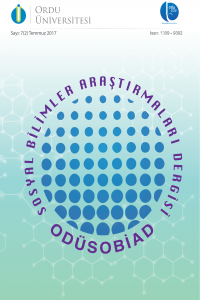Abstract
The aim of this study is to develop a scale to determine the possible attitudes of employees towards the workplace after the mobbing. During the scale development phase was created a Likert-type pre-test form. As a result of pre- experiment applications, the draft form was formed from 78 items. The draft form prepared on the internet was e-mailed to the academic staff of 30 of the 181 universities affiliated to the Council of Higher Education (CoHE) and the data were obtained according to the returned results. 1,326 recipients of 26,431 academic staff forms were returned. 561 pieces of draft scale data that were exposed to mobbing were taken into consideration. 22 items without contribution to substance analysis were removed from the scale. The appropriateness of 56 items to factor analysis was examined and the value of Kaiser-Meyer-Olkin (KMO) was obtained 0.918. When it is investigated the eigenvalues of 56 items, four factors with the highest eigenvalue are selected and the scale finally consists of 33 items. KMO value of confirmatory factor analysis was 0.907 and the result of Bartlett test was 4131,431. Cronbach Alpha internal consistency coefficient was found as 0.925 in the reliability analysis. There are four factors in the scale and it is composed of 33 items, 10 of which are positive and 23 of which are negative. The “Mobbing Attitude Scale” (MAS) developed in this research can be used to determine the attitudes of the employees towards the workplace after the mobbing. It is not only developed for academic staff, but it can also be applied to employees in other workplaces outside this profession.
Keywords
References
- Beydağ, K. D. & Arslan, H. (2008). Kadın doğum kliniklerinde çalışan ebe ve hemşirelerin profesyonelliklerini etkileyen faktörler. Fırat Sağlık Hizmetleri Dergisi, 3(7), 75-87.
- Björkqvist, K., Österman, K. & HjelBack, M. (1994). Aggression among university employees. Aggressive Behavior, 20, 173-184.
- Craig, W. (1998). The relationship among bullying, victimization, depression, anxiety and aggression in elementary school children. Personality and Individual Differences, 24, 123-130.
- Doğan, N. & Başokuçu, T. O. (2010). İstatistik tutum ölçeği için uygulanan faktör analizi ve aşamalı kümeleme analizi sonuçlarının karşılaştırılması. Eğitim ve Psikolojide Ölçme Değerlendirme Dergisi. 1 (2), 65-72.
- Einarsen, S., Hoel, H., Zapf, D. & Cooper, C. L. (2003). The concept of bullying at work: The European tradition. In S. Einarsen, H. Hoel, D. Zapf, & C.L. Cooper (Eds.), Bullying and emotional abuse in the workplace: International perspectives in research and practice (1st ed). (pp. 3-30). London: Taylor and Francis Group.
Abstract
Bu çalışmanın amacı çalışanların yıldırma sonucu işyerine yönelik
oluşabilecek tutumlarını belirleyebilmek için bir ölçme aracı geliştirmektir.
Ölçeği geliştirme aşamasında Likert tipinde bir ön deneme formu oluşturuldu. Ön
deneme uygulamaları sonucunda madde havuzu 78 maddeden oluştu. İnternet
ortamında düzenlenen taslak form Yükseköğretim Kurumu’na (YÖK) bağlı 181
üniversitenin 30’unda görev yapan akademik personele e-posta yolu ile
gönderildi ve geri dönen sonuçlara göre veriler elde edildi. Toplam 26.431
akademik personele gönderilen formlardan 1.326 adedi geri dönmüş ve yıldırmaya
maruz kalındığı belirtilen 561 adet taslak ölçek verisi değerlendirmeye
alınmıştır. Yapılan madde analizi sonucu katkısı olmayan 22 madde ölçek dışı
bırakılmıştır. Kalan 56 maddenin faktör analizine uygunluğu araştırılmış ve
Kaiser-Meyer-Olkin (KMO) değeri 0.918 çıkmıştır. 56 maddenin özdeğerlerine
bakıldığında, en yüksek özdeğere sahip dört faktör seçilmiş ve ölçek nihai
olarak 33 maddeden oluşmuştur. Doğrulayıcı faktör analizinin KMO değeri 0.907
ve Bartlett testi sonucu 4131,431 olduğu saptanmıştır. Yapılan güvenirlik
analizinde Cronbach Alpha iç tutarlılık katsayısı 0.925 olarak bulunmuştur.
Ölçekte dört faktör bulunmaktadır ve 10’u olumlu, 23’ü olumsuz toplam 33
maddeden oluşmaktadır. Sonuç olarak bu araştırmada geliştirilen “Yıldırma
Sonucu Tutum Ölçeği” (YSTÖ) çalışanların yıldırma sonucu işyerine yönelik
tutumlarını belirlemek amacıyla kullanılabilir. Ayrıca sadece akademik personel
için geliştirilmemiş olup bu meslek grubu dışında kalan diğer işyerlerindeki
çalışanlara da uygulanabilir.
Keywords
References
- Beydağ, K. D. & Arslan, H. (2008). Kadın doğum kliniklerinde çalışan ebe ve hemşirelerin profesyonelliklerini etkileyen faktörler. Fırat Sağlık Hizmetleri Dergisi, 3(7), 75-87.
- Björkqvist, K., Österman, K. & HjelBack, M. (1994). Aggression among university employees. Aggressive Behavior, 20, 173-184.
- Craig, W. (1998). The relationship among bullying, victimization, depression, anxiety and aggression in elementary school children. Personality and Individual Differences, 24, 123-130.
- Doğan, N. & Başokuçu, T. O. (2010). İstatistik tutum ölçeği için uygulanan faktör analizi ve aşamalı kümeleme analizi sonuçlarının karşılaştırılması. Eğitim ve Psikolojide Ölçme Değerlendirme Dergisi. 1 (2), 65-72.
- Einarsen, S., Hoel, H., Zapf, D. & Cooper, C. L. (2003). The concept of bullying at work: The European tradition. In S. Einarsen, H. Hoel, D. Zapf, & C.L. Cooper (Eds.), Bullying and emotional abuse in the workplace: International perspectives in research and practice (1st ed). (pp. 3-30). London: Taylor and Francis Group.
Details
| Subjects | Economics |
|---|---|
| Journal Section | ARTICLE |
| Authors | |
| Publication Date | July 7, 2017 |
| Submission Date | July 7, 2017 |
| Published in Issue | Year 2017 Volume: 7 Issue: 2 |

